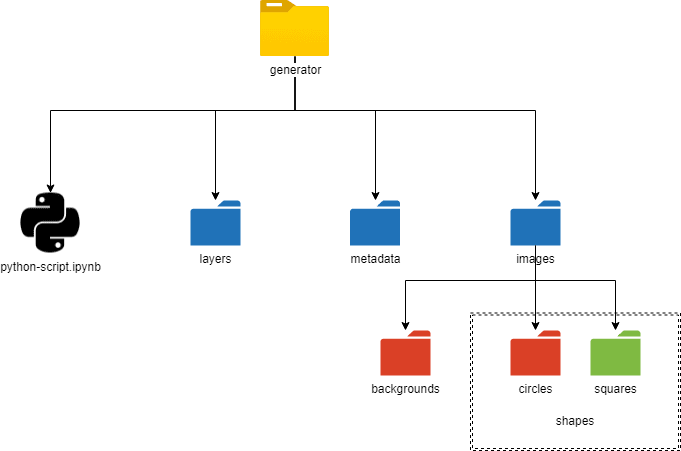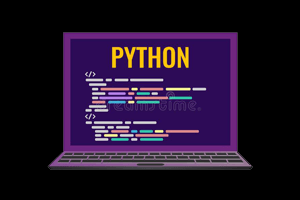Develop an nft image generator that uses a set of layers to generate a series of unique images
- Install
Python
Download link: https://www.python.org/downloads/
- Install PIP Download PIP get-pip.py
curl https://bootstrap.pypa.io/get-pip.py -o get-pip.py
python get-pip.py- Install Python Pillow
pip install pillow- Install Python display
pip install display- Install Jupyter Notebook
pip install jupyterFolder structure

- Run Jupyter in the project directory
jupyter notebook- Create a new notebook
from PIL import Image
from IPython.display import display
import random
import json- Inject all shapes and set their weights
# Each image is composed of a series of features
# The weight of each feature determines the rarity, which adds up to 100%
background = ["Blue", "Orange"]
background_weights = [30, 40]
circle = ["Blue", "Orange"]
circle_weights = [30, 15]
square = ["Blue","Orange"]
square_weights = [30, 15]
# Dictionary variables for each feature.
# Eech trait corresponds to its file name
# Add more shapes and colors as needed
background_files = {
"Blue": "blue",
"Orange": "orange",
}
square_files = {
"Blue": "blue-square",
"Orange": "orange-square",
}
circle_files = {
"Blue": "blue-circle",
"Orange": "orange-circle",
}- Create a function to generate unique image combinations
TOTAL_IMAGES = 30 #The number of random unique images we want to generate
all_images = []
def create_new_image():
new_image = {} #
#For each feature category, select a random feature according to the weight
new_image ["Background"] = random.choices(background, background_weights)[0]
new_image ["Circle"] = random.choices(circle, circle_weights)[0]
new_image ["Square"] = random.choices(square, square_weights)[0]
if new_image in all_images:
return create_new_image()
else:
return new_image
#Generate unique combinations based on feature weights
for i in range(TOTAL_IMAGES):
new_trait_image = create_new_image()
all_images.append(new_trait_image)- If all images are unique, return true
def all_images_unique(all_images):
seen = list()
return not any(i in seen or seen.append(i) for i in all_images)
print("Are all images unique?", all_images_unique(all_images))- Add a token ID for each image
i = 0
for item in all_images:
item["tokenId"] = i
i = i + 1- Print all images
print(all_images)- Get feature count
background_count = {}
for item in background:
background_count[item] = 0
circle_count = {}
for item in circle:
circle_count[item] = 0
square_count = {}
for item in square:
square_count[item] = 0
for image in all_images:
background_count[image["Background"]] += 1
circle_count[image["Circle"]] += 1
square_count[image["Square"]] += 1
print(background_count)
print(circle_count)
print(square_count)- Generate metadata for all features
METADATA_FILE_NAME ='./metadata/all-traits.json';
with open(METADATA_FILE_NAME,'w') as outfile:
json.dump(all_images, outfile, indent=4)- Generate image
for item in all_images:
im1 = Image.open(f'./layers/backgrounds/{background_files[item["Background"]]}.jpg').convert('RGBA')
im2 = Image.open(f'./layers/circles/{circle_files[item["Circle"]]}.png').convert('RGBA')
im3 = Image.open(f'./layers/squares/{square_files[item["Square"]]}.png').convert('RGBA')
#Create each composite
com1 = Image.alpha_composite(im1, im2)
com2 = Image.alpha_composite(com1, im3)
#Convert to RGB
rgb_im = com2.convert('RGB')
file_name = str(item["tokenId"]) + ".png"
rgb_im.save("./images/" + file_name)16.Generate metadata for each image
f = open('./metadata/all-traits.json',)
data = json.load(f)
IMAGES_BASE_URI = "ADD_IMAGES_BASE_URI_HERE"
PROJECT_NAME = "ADD_PROJECT_NAME_HERE"
def getAttribute(key, value):
return {
"trait_type": key,
"value": value
}
for i in data:
token_id = i['tokenId']
token = {
"image": IMAGES_BASE_URI + str(token_id) +'.png',
"tokenId": token_id,
"name": PROJECT_NAME + '' + str(token_id),
"attributes": []
}
token["attributes"].append(getAttribute("Background", i["Background"]))
token["attributes"].append(getAttribute("Circle", i["Circle"]))
token["attributes"].append(getAttribute("Square", i["Square"]))
with open('./metadata/' + str(token_id),'w') as outfile:
json.dump(token, outfile, indent=4)
f.close()It outputs all generated images to the /images folder and metadata to the /metadata folder. The file name will refer to tokenIds

Post comment 取消回复